West and Central Africa
Contact the team
Featured content

Why you need a plan A, B and C: Using cash in hard-to-reach contexts
Blog Post
Cash and Voucher Assistance (CVA) can be a valuable response choice in hard-to-reach areas, but it must be properly adapted to context with sufficient investment given to preparedness. Mirko Tommasi explains how preparing multiple plans, being flexible and ready to change plans fast and frequently is crucial for success in challenging contexts.

CVA for people on the move: Time for a new vision?
Webinar recording
This event presented the main findings of our recently released study People are on the move: Can the world of CVA keep up? Analysis of the use of CVA in the context of human mobility in the Americas. Additionally, invited guests discussed key issues on facing the topic of human mobility and CVA and answered questions from the audience. The event included two videos’ interventions: one...

Changes to US and UN economic sanctions may simplify CVA implementation
Blog Post
Recent changes to the UN and US economic sanctions regimes promise to improve cash transfer process across international borders, but changes might not be as quick or comprehensive as we would hope. We put eight questions to Rory Crew, who has looked into the matter for you.
161 – 180 of 239 results

Humanitarian Cash Transfers in the Democratic Republic of Congo
Report
The Democratic Republic of Congo (DRC) is at a crossroads with regard to cash transfers. On the one hand, cash has been accepted by most donors and aid agencies as an appropriate response, with solid evidence underpinning its use. Aid agencies have driven important innovations in an environment where...
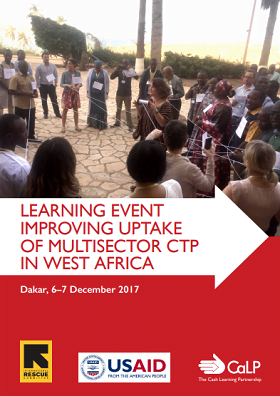
Improving Uptake of Multi-Sector CTP in West Africa: Learning Event Report
Report
In December 2017, the CALP Network and the IRC came together to organize a two-day learning event to align understanding and share experiences of countries working on the definition of Minimum Expenditure Baskets, and to contribute to bridging capacity gaps in Market Analysis, a critical step for CTP...

Cash Working Groups: A preliminary mapping
Report
Brief overview of the state of cash working groups in emergency settings.
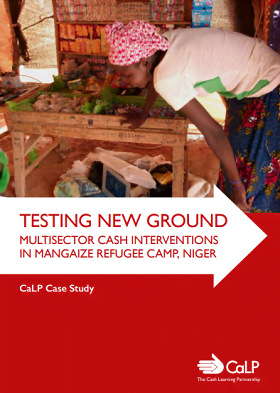
Testing new ground. Multisector cash interventions in Mangaize refugee camp Niger
Report
In the midst of the Mali refugee crisis in Niger, UNHCR implemented one of the first multisector cash transfer projects in Mangaize refugee camp in 2015, providing refugees with grants covering non-food items, hygiene, shelter and livelihood needs. The cash project came on the heels of a successful food...
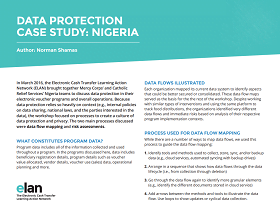
Data Protection Case Study: Nigeria
Report
In March 2016, the Electronic Cash Transfer Learning Action Network (ELAN) brought together Mercy Corps’ and Catholic Relief Services’ Nigeria teams to discuss data protection in their electronic voucher programs and overall operations. Because data protection relies so heaviliy on context (e.g.,...

What to know: working with humanitarians on e-cash programs
Report
International humanitarian assistance rose to a record US$24.5 billion in 2014. The 2015 Global Humanitarian Assistance Report indicated that over US$200 million of this was used in cash and voucher programs. An increasing number of humanitarian actors have begun to deliver cash electronically, through...

Evaluation of the Kenya Hunger Safety Net Programme Phase 2: Drought Emergency Scale-up Payments Process Review – Final report
Report
This report presents findings from the process review of the Hunger and Safety Net Programme (HSNP) drought emergency scale-up payments, commissioned under the independent evaluation of the HSNP. The review provides an independent account of stakeholders’ experiences in the implementation of the first...
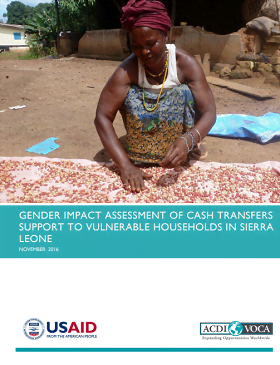
Gender impact assessment of cash transfers support to vulnerable households in Sierra Leone
Report
This report outlines the findings and recommendations from a qualitative assessment carried out to complement and further develop the findings from a recently concluded quantitative study of SNAP+ in order to better understand the driving factors behind behavior during the Ebola crises. The quantitative...

Intra-Household Dynamics and the Design of Social Protection Programs: The Case of Polygamous Households in North Burkina Faso
Case Study
A recent overview of World Bank social safety net programs and gender highlighted the need for greater consideration of intra-household dynamics in the design of social protection programs (Bardasi 2014). During program design, decisions have to be made about who to target, how much and how often to give...

Using Cash for Shelter: An Overview of CRS Programs
Report
Cash continues to gain prevalence as a modality for humanitarian agencies to help people meet multiple and diverse needs in the wake of a crisis. It provides people with the dignity of choice, and is often significantly more cost-efficient than the delivery of in-kind aid. In programs with a shelter...
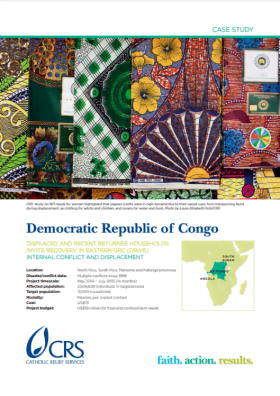
Using Cash for Shelter: Displaced and Recent Returnee Households Invite Recovery in Eastern DRC (DRIVE) Internal Conflict and Displacement
Case Study
The Democratic Republic of Congo, or DRC, has endured multiple conflicts since 1996, including armed conflict in Eastern DRC in 2012 and 2013. In December 2014, the United Nations Office for the Coordination of Humanitarian Affairs in the DRC reported that the armed conflict had internally displaced 2.72...
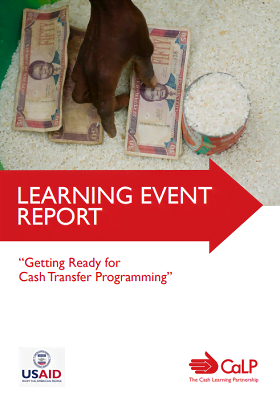
Learning Event Report " Getting ready for cash transfer programming"
Report
Despite the rapid, dynamic evolution of cash transfer implementation in West Africa, actors’ lack of preparation means that the tool cannot fulfil its potential. As a result, the scope of interventions remains limited, the combination of different methods is not often envisaged, the most...
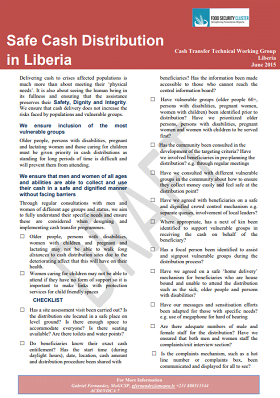
Safe Cash Distribution in Liberia
Report
Delivering cash to crises affected populations is much more than about meeting their ‘physical needs’. It is also about seeing the human being in its fullness and ensuring that the assistance preserves their Safety, Dignity and Integrity. We ensure that cash delivery does not increase the risks faced...
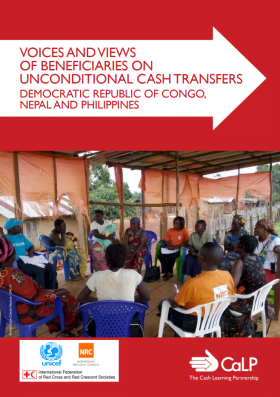
Voices and Views of Beneficiaries on Unconditional Cash Transfers – Democratic Republic of Congo, Nepal and the Philippines
Report
Providing cash in humanitarian emergencies is expanding and the topic is well under discussion within the humanitarian sector with topics ranging from high-level consideration of cash as a tool to transform humanitarian aid, the significance of cash as a way to support beneficiary choice and dignity...
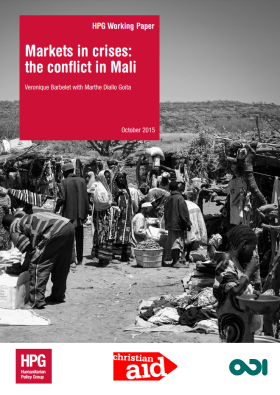
Markets in Crises: The Conflict in Mali
Case Study
Humanitarian agencies routinely conduct market analyses to inform decisions around transfer modality – cash, voucher or in-kind – with a strong emphasis on the availability and price of key commodities. However, in the last few years humanitarian organisations have expanded their scope to...
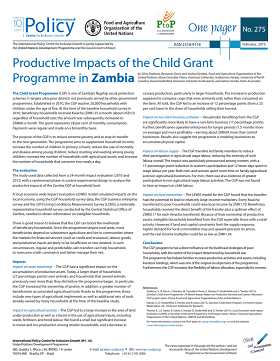
Productive Impacts of the Child Grant Programme in Zambia
Report
This short one page paper looks at the impacts of the Child Grant Programme in Zambia on asset ownership, agricultural activity, non-farm business activities, labour supply and local economies. The CGP is one of Zambia’s flagship social protection schemes. It targets ultra-poor districts not previously...

Cost-Effectiveness Analysis of Cash-Based Food Assistance Projects: A case study and discussion paper of findings in Niger
Report
Despite recent and expanding literature on cost effectiveness and value for money, there is little by way of guidance for the implementation of cost-effectiveness analysis in humanitarian and development programming. This report distills findings from the literature on ex post cost-effectiveness analysis,...

Impacts of the Child Grant Programme (CGP) on the Local Economy in Zambia
Report
In this research brief, local economy-wide impact evaluation (LEWIE) simulation methods are used to assess the likely impacts of cash transfers on the local economy. When the Child Grant Programme (CGP) gives money to beneficiary households, they spend it to buy goods and services. As this cash circulates...
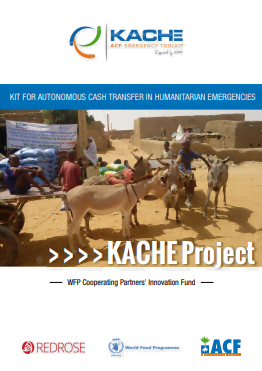
Kit for Autonomous Cash transfer in Humanitarian Emergencies (KACHE)
Guidelines and Tools
The present document reports the development of the Kit for Autonomous Cash transfer in Humanitarian Emergencies (KACHE), built upon Red Rose ONE system© supported by the WFP’s Cooperating Partners’ Innovation Fund (CPIF). Firstly, it gives a brief description of the main features of the kit....

Liberia Ebola Response
Presentation
ICRCs EVD Cash response program had to be designed under a rare circumstance of insufficient baseline data on EVD impact on household level and limited opportunity to contact intended beneficiaries for a detailed assessment/ proper situational analysis.


